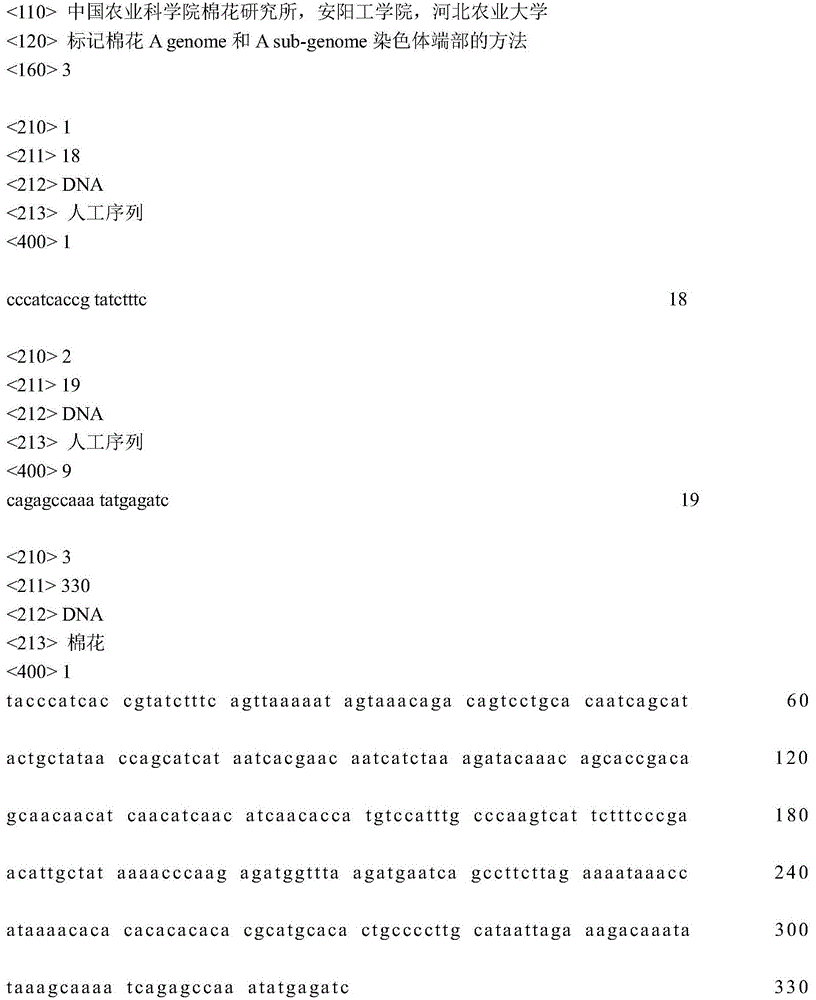A Method for Marking Cotton A Genome and A Sub-genome Chromosome Ends
A chromosome and artificial chromosome technology, applied in the field of molecular cytogenetics, can solve the problems of difficult target chromosome combination and low signal detection rate
Inactive Publication Date: 2016-05-04
INST OF COTTON RES CHINESE ACAD OF AGRI SCI +2
View PDF2 Cites 0 Cited by
- Summary
- Abstract
- Description
- Claims
- Application Information
AI Technical Summary
Problems solved by technology
The length of the probe DNA fragment in the test is also the main factor for the success of the test. If the probe fragment is too short, it will encounter problems such as difficulty in combining with the target chromosome and low signal detection rate.
Method used
the structure of the environmentally friendly knitted fabric provided by the present invention; figure 2 Flow chart of the yarn wrapping machine for environmentally friendly knitted fabrics and storage devices; image 3 Is the parameter map of the yarn covering machine
View moreImage
Smart Image Click on the blue labels to locate them in the text.
Smart ImageViewing Examples
Examples
Experimental program
Comparison scheme
Effect test
Embodiment 1
[0025] Example 1 Using BAC clone 350B21 as a probe, fluorescence in situ hybridization of upland cotton ((AD) 1 ), straw cotton (A 1 ), Raymond cotton (D 5 ) mitotic metaphase chromosomes.
[0026] 1 Materials and methods
[0027] 1.1 Experimental materials
the structure of the environmentally friendly knitted fabric provided by the present invention; figure 2 Flow chart of the yarn wrapping machine for environmentally friendly knitted fabrics and storage devices; image 3 Is the parameter map of the yarn covering machine
Login to View More PUM
 Login to View More
Login to View More Abstract
The invention belongs to the field of molecular cytogenetic, and concretely relates to a method for marking chromosome terminals of cotton A genome and A sub-genome. The method comprises: using BAC coming from gossypium barbadense pima-90BAC library to clone 350B21, performing BAC-FISH on mitosis mid-term chromosomes of different cotton species, and discovering the phenomena that the terminals of all chromosomes of A genome and A sub-genome generate strong hybridization signals, while the hybridization signals of all chromosomes of D genome and D sub-genome are not obvious. By utilizing the BAC-FISH method for BAC cloning, the chromosome terminals of cotton A genome and A sub-genome can be rapidly effectively marked.
Description
technical field [0001] The invention belongs to the field of molecular cytogenetics, in particular to a method for marking cotton Agenome and Asub-genome chromosome ends. Background technique [0002] Cotton is an important economic fiber crop in the world, and it is also a model plant for studying cytogenetics, plant polyploidization, genome structure and genome evolution. Gossypium consists of 8 diploid genomes (A-K) and 1 tetraploid genome (AD). Among them, the A genome and the D genome diverged about 6.7 million years ago, and after about 5 million years of independent evolution, in a polyploidization event about 1-2 million years ago, the existing 5 allotetraploid cotton species. [0003] The development of fluorescence in situ hybridization technology marks the entry of cytogenetics from the era of classical cytogenetics into the era of modern molecular cytogenetics. This technology uses the probe DNA fragments stained with fluorescent dyes to hybridize with the tar...
Claims
the structure of the environmentally friendly knitted fabric provided by the present invention; figure 2 Flow chart of the yarn wrapping machine for environmentally friendly knitted fabrics and storage devices; image 3 Is the parameter map of the yarn covering machine
Login to View More Application Information
Patent Timeline
 Login to View More
Login to View More Patent Type & Authority Patents(China)
IPC IPC(8): C12Q1/68
CPCC12Q1/6841C12Q2543/10
Inventor 崔兴雷刘方彭仁海王省芬王春英周忠丽蔡小彦王星星王玉红马峙英王坤波
Owner INST OF COTTON RES CHINESE ACAD OF AGRI SCI
Features
- R&D
- Intellectual Property
- Life Sciences
- Materials
- Tech Scout
Why Patsnap Eureka
- Unparalleled Data Quality
- Higher Quality Content
- 60% Fewer Hallucinations
Social media
Patsnap Eureka Blog
Learn More Browse by: Latest US Patents, China's latest patents, Technical Efficacy Thesaurus, Application Domain, Technology Topic, Popular Technical Reports.
© 2025 PatSnap. All rights reserved.Legal|Privacy policy|Modern Slavery Act Transparency Statement|Sitemap|About US| Contact US: help@patsnap.com


